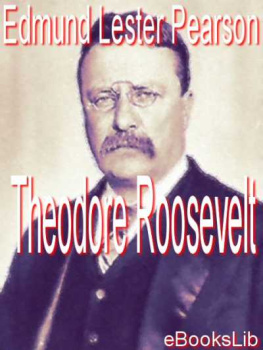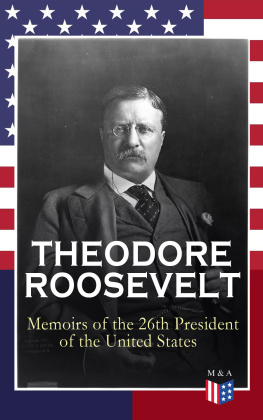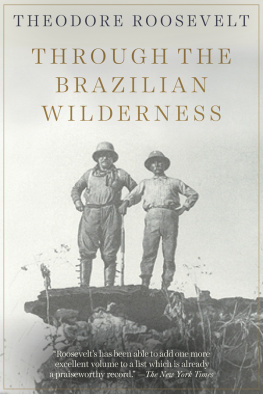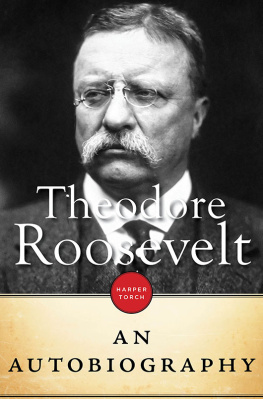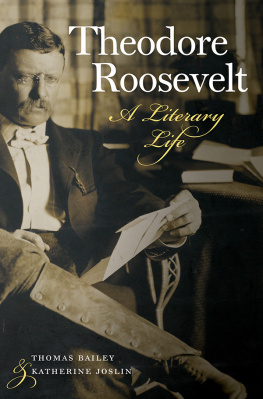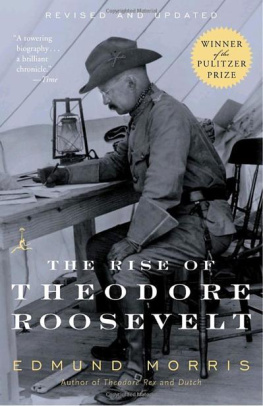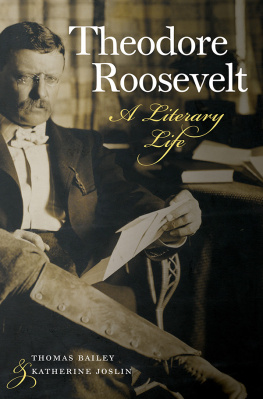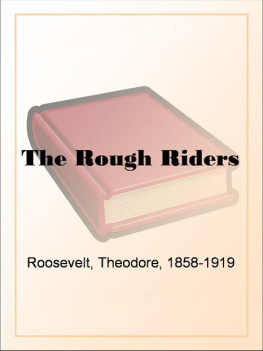Edmund Lester Pearson - Theodore Roosevelt
Here you can read online Edmund Lester Pearson - Theodore Roosevelt full text of the book (entire story) in english for free. Download pdf and epub, get meaning, cover and reviews about this ebook. year: 2005, publisher: eBooksLib, genre: History. Description of the work, (preface) as well as reviews are available. Best literature library LitArk.com created for fans of good reading and offers a wide selection of genres:
Romance novel
Science fiction
Adventure
Detective
Science
History
Home and family
Prose
Art
Politics
Computer
Non-fiction
Religion
Business
Children
Humor
Choose a favorite category and find really read worthwhile books. Enjoy immersion in the world of imagination, feel the emotions of the characters or learn something new for yourself, make an fascinating discovery.
- Book:Theodore Roosevelt
- Author:
- Publisher:eBooksLib
- Genre:
- Year:2005
- Rating:3 / 5
- Favourites:Add to favourites
- Your mark:
- 60
- 1
- 2
- 3
- 4
- 5
Theodore Roosevelt: summary, description and annotation
We offer to read an annotation, description, summary or preface (depends on what the author of the book "Theodore Roosevelt" wrote himself). If you haven't found the necessary information about the book — write in the comments, we will try to find it.
Theodore Roosevelt — read online for free the complete book (whole text) full work
Below is the text of the book, divided by pages. System saving the place of the last page read, allows you to conveniently read the book "Theodore Roosevelt" online for free, without having to search again every time where you left off. Put a bookmark, and you can go to the page where you finished reading at any time.
Font size:
Interval:
Bookmark:
It was converted from clean and standard xhtml/xml files.
It uses metatags to identify content, and other data.
The available resources specific to each ebook format were used togive the reader a pleasant reading experience.
More details available at the ebookslib.com website.
Any suggestions that help us improve these editions arewelcome.
2011 ebookslib.com
eBook Version
eBooksLib.com
eBooksLib, eBooksLib.com are Registered trademarks owned byeBooksDistrib S.A.R.L (LLC)
___________________
November-2011
ISBN : 978-1-4121-6912-7

T he author wishesto express his gratitude for permission to refer to the works whichhave been consulted in writing this book.
First and foremost, to Mr. William Roscoe Thayer,for "Theodore Roosevelt; An Intimate Biography." (Houghton, MifflinCo.)
To Messrs. Charles Scribner's Sons for thesewritings of Theodore Roosevelt: "African Game Trails"; "TheodoreRoosevelt: An Autobiography"; "The Rough Riders"; "Through theBrazilian Wilderness"; "History as Literature." And for "TheodoreRoosevelt and His Time" by Joseph Bucklin Bishop, in Scribner'sMagazine, for December, 1919.
To Messrs. Harper and Brothers and to Mr. HermannHagedorn for "The Boys' Life of Theodore Roosevelt" by HermannHagedorn.
To The Century Company for these books by TheodoreRoosevelt: "The Strenuous Life"; "Ranch Life and the HuntingTrail."
To Messrs. G. P. Putnam's Sons for these books byTheodore Roosevelt: "American Ideals"; "The Wilderness Hunter."
To Mr. Charles G. Washbura for his "TheodoreRoosevelt; the Logic of His Career." (Houghton, Mifflin Co.)
To Messrs Doubleday, Page & Co. and to Mr.Lawrence F. Abbott for "Impressions of Theodore Roosevelt" byLawrence F. Abbott.


I f you had beenin New York in 1917 or 1918 you might have seen, walking quicklyfrom a shop or a hotel to an automobile, a thick- set but activeand muscular man, wearing a soft black hat and a cape overcoat.Probably there would have been a group of people waiting on thesidewalk, as he came out, for this was Theodore Roosevelt,Ex-President of the United States, and there were more Americanswho cared to know what he was doing, and to hear what he wassaying, than cared about any other living man.
Although he was then a private citizen, holding nooffice, he was a leader of his country, which was engaged in theGreat War. Americans were being called upon, - the younger men torisk their lives in battle, and the older people to suffer andsupport their losses. Theodore Roosevelt had always said that itwas a good citizen's duty cheerfully to do one or the other ofthese things in the hour of danger. They knew that he had doneboth; and so it was to him that men turned, as to a strong andbrave man, whose words were simple and noble, and what was moreimportant, whose actions squared with his words.
He had come back, not long before, from one of hishunting trips, and it was said that fever was still troubling him.The people wish to know if this is true, and one of the men on thesidewalk, a reporter, probably, steps forward and asks him aquestion.
He stops for a moment, and turns toward the man. Notmuch thought of sickness is left in the mind of any one there! Hisface is clear, his cheeks ruddy, - the face of a man who livesoutdoors; and his eyes, light-blue in color, look straight at thequestioner. One of his eyes, it had been said, was dimmed orblinded by a blow while boxing, years before, when he wasPresident. But no one can see anything the matter with the eyes;they twinkle in a smile, and as his face puckers up, and his whiteteeth show for an instant under his light-brown moustache, thegroup of people all smile, too.
His face is so familiar to them, - it is as if theywere looking at somebody they knew as well as their own brothers.The newspaper cartoonists had shown it to them for years. No oneelse smiled like that; no one else spoke so vigorously.
"Never felt better in my life!" he answers, bendingtoward the man.
"But thank you for asking!" and there is a pleasantand friendly note in his voice, which perhaps surprises some ofthose who, though they had heard much of his emphatic speech, knewbut little of his gentleness. He waves his hand, steps into theautomobile, and is gone.
Theodore Roosevelt was born October 27, 1858, in NewYork City, at 28 East Twentieth Street. The first Roosevelt of hisfamily to come to this country was Klaes Martensen van Rooseveltwho came from Holland to what is now New York about 1644. He was a"settler," and that, says Theodore Roosevelt, remembering the sillyclaims many people like to make about their long-dead ancestors, isa fine name for an immigrant, who came over in the steerage of asailing ship in the seventeenth century instead of the steerage ofa steamer in the nineteenth century. From that time, for the nextseven generations, from father to son, every one of the family wasborn on Manhattan Island. As New Yorkers say, they were "straightNew York."
Immigrant or settler, or whatever Klaes vanRoosevelt may have been, his children and grandchildren had in themmore than ordinary ability. They were not content to stand still,but made themselves useful and prosperous, so that the name wasknown and honored in the city and State even before the birth ofthe son who was to make it illustrious throughout the world.
"My father," says the President, "was the best man Iever knew.... He never physically punished me but once, but he wasthe only man of whom I was ever really afraid." The elder Rooseveltwas a merchant, a man courageous and gentle, fond of horses andcountry life. He worked hard at his business, for the SanitaryCommission during the Civil War, and for the poor and unfortunateof his own city, so hard that he wore himself out and died atforty-six. The President's mother was Martha Bulloch from Georgia.Two of her brothers were in the Confederate Navy, so while theCivil War was going on, and Theodore Roosevelt was a little boy,his family like so many other American families, had in it thosewho wished well for the South, and those who hoped for the successof the North.
Many American Presidents have been poor when theywere boys. They have had to work hard, to make a way forthemselves, and the same strength and courage with which they didthis has later helped to bring them into the White House. It hasseemed as if there were magic connected with being born in alog-cabin, or having to work hard to get an education, so that onlythe boys who did this could become famous. Of course it is what isin the boy himself, together with the effect his life has had onhim, that counts. The boy whose family is rich, or even well-off,has something to struggle against, too. For with these it is easyto slip into comfortable and lazy ways, to do nothing because onedoes not have to do anything. Some men never rise because theirearly life was too hard; some, because it was too easy.
Roosevelt might have had the latter fate. His fatherwould not have allowed idleness; he did not care aboutmoney-making, especially, but he did believe in work, for himselfand his children. When the father died, and his son was left withenough money to have lived all his days without doing a stroke ofwork, he already had too much grit to think of such a life. And hehad too much good sense to start out to become a millionaire and topile million upon useless million.
Font size:
Interval:
Bookmark:
Similar books «Theodore Roosevelt»
Look at similar books to Theodore Roosevelt. We have selected literature similar in name and meaning in the hope of providing readers with more options to find new, interesting, not yet read works.
Discussion, reviews of the book Theodore Roosevelt and just readers' own opinions. Leave your comments, write what you think about the work, its meaning or the main characters. Specify what exactly you liked and what you didn't like, and why you think so.

